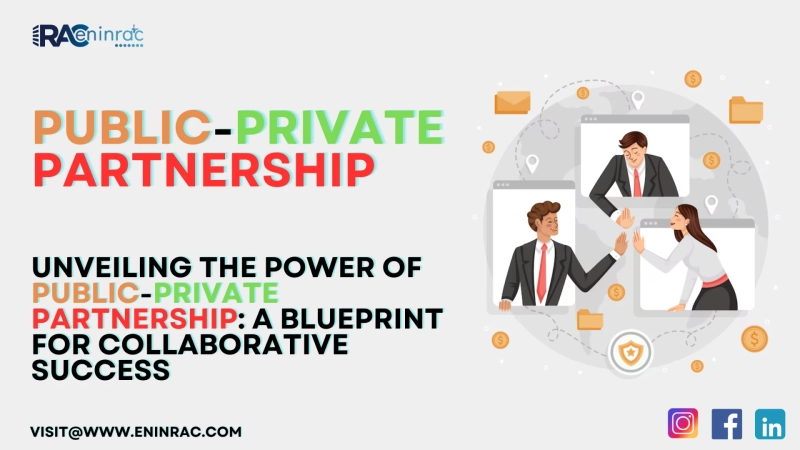Introduction: In today’s complex socio-economic landscape, the concept of Public-Private Partnership (PPP) stands as a beacon of collaborative innovation. Rooted in the synergy between government entities and private enterprises, PPPs have emerged as a transformative model for delivering public services, infrastructure, and development projects worldwide. This blog delves deep into the essence of PPPs, exploring their significance, challenges, and potential impact on society.
Understanding Public-Private Partnership
Defining PPPs Public-Private Partnership, commonly known as PPP, refers to a collaborative arrangement between public sector entities (government or governmental agencies) and private sector companies. This partnership involves the sharing of resources, risks, responsibilities, and rewards in the delivery of a public service or infrastructure project.
Types of PPPs PPPs can manifest in various forms, including Build-Operate-Transfer (BOT), Build-Own-Operate (BOO), Build-Operate-Own (BOO), Concession Contracts, and Management Contracts. Each model entails distinct roles, financing structures, and levels of private sector involvement, tailored to the specific needs and objectives of the project.
Advantages of Public-Private Partnership
Efficiency and Innovation One of the primary advantages of PPPs lies in their ability to harness the efficiency and innovation inherent in the private sector. By leveraging private sector expertise, technology, and resources, PPPs often result in cost-effective solutions, streamlined project delivery, and enhanced service quality.
Risk Sharing PPPs distribute risks between public and private partners, mitigating the financial burden on either party. Private sector involvement can absorb certain risks, such as construction delays, cost overruns, and revenue fluctuations, thereby safeguarding taxpayers’ interests and ensuring project viability.
Infrastructure Development PPPs play a pivotal role in addressing the global infrastructure deficit by mobilizing private capital for public infrastructure projects. From transportation and utilities to healthcare and education facilities, PPPs facilitate the timely development and maintenance of critical infrastructure assets, fostering economic growth and societal progress.
Challenges and Considerations
Complexity of Contracts The intricacy of PPP contracts poses a significant challenge, requiring meticulous negotiation, legal expertise, and risk allocation mechanisms. Balancing the interests of public stakeholders, private investors, and project financiers demands comprehensive contractual frameworks that address governance, performance standards, and dispute resolution mechanisms.
Political and Regulatory Risks PPPs are susceptible to political and regulatory uncertainties, ranging from policy changes and regulatory amendments to geopolitical instability and sovereign risks. Shifts in government priorities, changes in legislation, and unforeseen events can disrupt project timelines, investment returns, and stakeholder confidence, necessitating robust risk management strategies and contingency plans.
Community Engagement and Transparency Maintaining public trust and stakeholder engagement is paramount in PPPs, given their implications for communities and citizens. Transparent procurement processes, stakeholder consultations, and accountability mechanisms are essential to ensure public scrutiny, foster inclusivity, and mitigate social and environmental impacts associated with PPP projects.
Case Studies in Public-Private Partnership
London Underground Upgrade (LUUP), United Kingdom The London Underground Upgrade project exemplifies a successful PPP initiative aimed at modernizing and expanding the city’s subway network. Through a consortium of public and private partners, including Transport for London (TfL) and private infrastructure investors, LUUP implemented critical infrastructure upgrades, rolling stock enhancements, and operational improvements, enhancing passenger experience and system reliability.
Gujarat International Finance Tec-City (GIFT City), India Gujarat International Finance Tec-City (GIFT City) in India represents a pioneering PPP endeavor to develop a world-class financial hub and smart city infrastructure. Jointly developed by the Government of Gujarat and private sector stakeholders, GIFT City leverages innovative financing models, regulatory incentives, and urban planning strategies to attract investment, foster economic diversification, and promote sustainable urban development.
The Future of Public-Private Partnership
Innovation and Digitization The future of PPPs hinges on innovation and digitization, as emerging technologies such as artificial intelligence, blockchain, and Internet of Things (IoT) revolutionize service delivery, infrastructure management, and stakeholder engagement. Integrating digital solutions into PPP projects can optimize operations, enhance decision-making, and unlock new opportunities for collaboration and value creation.
Sustainable Development Goals (SDGs) PPPs are poised to play a pivotal role in advancing the United Nations Sustainable Development Goals (SDGs), spanning poverty alleviation, climate action, infrastructure development, and inclusive growth. By aligning PPP projects with the SDGs, stakeholders can leverage private sector capital, expertise, and innovation to address pressing global challenges and create lasting social, economic, and environmental impact.
Conclusion: Public-Private Partnership represents a dynamic paradigm for collaboration and innovation, transcending traditional boundaries to drive socio-economic progress and sustainable development. By harnessing the complementary strengths of public and private sectors, PPPs hold the potential to unlock new frontiers of growth, prosperity, and shared value for communities worldwide. As we navigate the complexities of a rapidly evolving world, embracing the principles of partnership, transparency, and innovation will be paramount in shaping a future where PPPs serve as catalysts for positive change.


